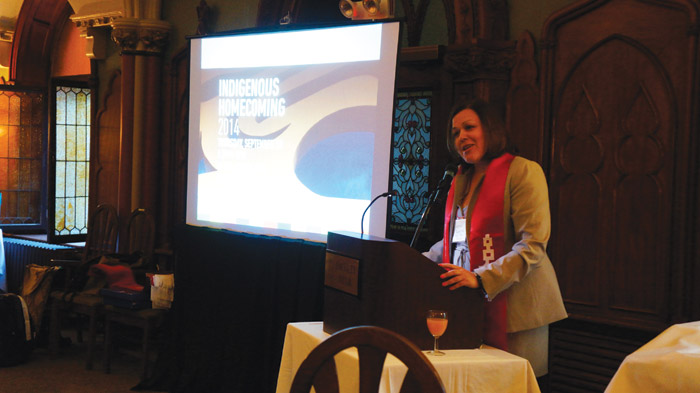Last Thursday, Dr. Audra Simpson, a Mohawk scholar who received her PhD in Anthropology from McGill, and is currently an associate professor at Columbia University, addressed how McGill shaped her scholarly mind and the problems the university still faces in addressing indigenous issues at McGill’s first Indigenous Homecoming.
Simpson discussed the rigorous standards she faced at McGill during her time as a student, saying that the level of quality required was excessive in hindsight, but taught her how to deal with criticism.
“I’ve often talked to my colleague,” Simpson said. “We remembered how McGill simply taught us how to write, how to revise, how this made us absolutely fearless, so much so that we can literally take any form of critique and sift it for its value, not take anything personally and simply take it as need be.”
Yet for all its academic excellency, Simpson argued, McGill still needed to address the indigenous history that was intertwined with its own. Simpson asserted that her research showed that the university in its early days was kept afloat by money from unauthorized land sales by the Six Nations of the Grand River.
“McGill comes into being in a sea of dispossession,” Simpson said. “By this I mean two things: One, this land belonged to [indigenous peoples]. Second, and more specifically, McGill comes into being at a time when land is being wrested from indigenous peoples in bit-by-bit pieces.”
Simpson asked that McGill take actions to right its historical wrongs.
“What is needed along this to revitalize hidden pasts […] is diversifying this university in lines that do not paper over this history over further, that mark it, that act from it,” she said.
Simpson then questioned the audience on McGill’s current state of diversity.
“And here I want to ask, where are the indigenous scholars at McGill, scholars in tenure track and tenure positions,” she asked. “Part of excellence is diversity, right?”
Paige Issac, coordinator of the First Peoples’ House, said that the first Indigenous Homecoming idea arose out of the traditional alumni honouring ceremony at the Annual Pow Wow.
“This year we had our first ever homecoming event,” Issac said. “We had 20 or so people show up,” “I’ve heard such great feedback already.”
Issac also praised the efforts of Indigenous Education Advisor Allan Vicaire in organizing the Indigenous Awareness week.
According to Vicaire, student response to the week has been very positive.
“Students have personally come up to me to say, ‘Wow I’ve never heard about this before,’ whether it’s about inter-generational violence or just having a discussion about accountability and responsibility within an academy. So it’s been really positive, very constructive.”
However, Vicaire says indigenous students at McGill still face challenges, although steps are being made to improve the situation.
“Microaggressions do happen on campus,” he said. “ We’re often tokenized, or put in the place of being a cultural expert. [We need to] create that environment of inclusion, provide those education opportunities and create a safe space [for indigenous students].”
Issac acknowledged that although McGill still had problems in regards of lack of an indigenous scholar, it was making progress.
“Obviously there is still a lot of work to do but I’m happy in our achievements so far, and I’m happy to work on whatever comes next,” Issac said. “I see a lot of things building here at McGill, in terms of increasing indigenous awareness […] making it a place where indigenous students feel like they belong and they can thrive and have a sense of community here.”
Vicaire echoed the sentiment.
“We’re always striving and working to enhance the question of diversity within the faculties,” he said. “I think it takes a lot of work, not only from the administration but also from faculty, staff, and students. It’s a stepping stone and unfortunately within institutions, it takes a while for change to happen, but [we have] to recognize we’re all a part of this change.”
Additional reporting by Shrinkhala Dawadi.









